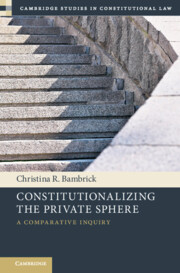Refine search
Actions for selected content:
74 results
Human and Created: Expanding the Common Good with Integral Ecology
-
- Journal:
- Horizons , First View
- Published online by Cambridge University Press:
- 18 November 2025, pp. 1-31
-
- Article
- Export citation
Chapter 1 - Hegel and Liberalism
- from Part I - Hegel, Freedom and Liberalism
-
- Book:
- Hegel Beyond Liberalism
- Published online:
- 27 September 2025
- Print publication:
- 16 October 2025, pp 13-36
-
- Chapter
- Export citation
Chapter 8 - Happiness and Virtue
- from Part II - Aquinas, Happiness, and the Unity of Ethics
-
- Book:
- Aquinas and the Ethics of Happiness
- Published online:
- 07 August 2025
- Print publication:
- 21 August 2025, pp 222-257
-
- Chapter
- Export citation
Chapter 7 - Happiness and Law
- from Part II - Aquinas, Happiness, and the Unity of Ethics
-
- Book:
- Aquinas and the Ethics of Happiness
- Published online:
- 07 August 2025
- Print publication:
- 21 August 2025, pp 182-221
-
- Chapter
- Export citation
Chapter 6 - From Individual Happiness to Common Happiness
- from Part II - Aquinas, Happiness, and the Unity of Ethics
-
- Book:
- Aquinas and the Ethics of Happiness
- Published online:
- 07 August 2025
- Print publication:
- 21 August 2025, pp 155-181
-
- Chapter
- Export citation
2 - Natural Law and Rights
- from Part I - Foundations
-
- Book:
- Natural Property Rights
- Published online:
- 17 April 2025
- Print publication:
- 24 April 2025, pp 33-57
-
- Chapter
- Export citation
8 - Conclusion
- from Transformation
-
- Book:
- Constitutionalizing the Private Sphere
- Published online:
- 23 January 2025
- Print publication:
- 06 February 2025, pp 271-278
-
- Chapter
- Export citation
7 - The European Union
- from Transformation
-
- Book:
- Constitutionalizing the Private Sphere
- Published online:
- 23 January 2025
- Print publication:
- 06 February 2025, pp 243-270
-
- Chapter
- Export citation
1 - Introduction
-
- Book:
- Constitutionalizing the Private Sphere
- Published online:
- 23 January 2025
- Print publication:
- 06 February 2025, pp 1-15
-
- Chapter
- Export citation
2 - A Republican Vein in Liberal Constitutionalism
-
- Book:
- Constitutionalizing the Private Sphere
- Published online:
- 23 January 2025
- Print publication:
- 06 February 2025, pp 16-58
-
- Chapter
- Export citation

Constitutionalizing the Private Sphere
- A Comparative Inquiry
-
- Published online:
- 23 January 2025
- Print publication:
- 06 February 2025
Chapter 8 - Thriving Societies
-
-
- Book:
- How People Thrive
- Published online:
- 14 November 2024
- Print publication:
- 21 November 2024, pp 234-260
-
- Chapter
- Export citation
Chapter 9 - Thriving World
-
-
- Book:
- How People Thrive
- Published online:
- 14 November 2024
- Print publication:
- 21 November 2024, pp 261-287
-
- Chapter
- Export citation
2 - Islamic Norms, Interpretations, Applications
-
- Book:
- Refining the Common Good
- Published online:
- 08 November 2024
- Print publication:
- 21 November 2024, pp 30-46
-
- Chapter
- Export citation
8 - Reflections on Islam and Politics in the Oil Era
-
- Book:
- Refining the Common Good
- Published online:
- 08 November 2024
- Print publication:
- 21 November 2024, pp 167-174
-
- Chapter
- Export citation
On the Government of a City
- from Texts
-
- Book:
- Bartolus of Sassoferrato
- Published online:
- 14 November 2024
- Print publication:
- 21 November 2024, pp 16-33
-
- Chapter
- Export citation
On Guelfs and Ghibellines
- from Texts
-
- Book:
- Bartolus of Sassoferrato
- Published online:
- 14 November 2024
- Print publication:
- 21 November 2024, pp 3-15
-
- Chapter
- Export citation
Envisioning the Beloved Community: Racial Justice, Property Law, and the Social Mortgage
-
- Journal:
- Journal of Law and Religion / Volume 39 / Issue 3 / September 2024
- Published online by Cambridge University Press:
- 25 September 2024, pp. 377-397
-
- Article
-
- You have access
- HTML
- Export citation
Chapter 9 - A Perfect Planet
- from Part III - Transfiguration and Global Perfection
-
- Book:
- Human Perfection, Transfiguration and Christian Ethics
- Published online:
- 09 May 2024
- Print publication:
- 16 May 2024, pp 195-221
-
- Chapter
- Export citation
Should Catholics Support Laws Prohibiting Abortion?
-
- Journal:
- New Blackfriars / Volume 105 / Issue 3 / May 2024
- Published online by Cambridge University Press:
- 18 April 2024, pp. 244-264
- Print publication:
- May 2024
-
- Article
-
- You have access
- Open access
- HTML
- Export citation
